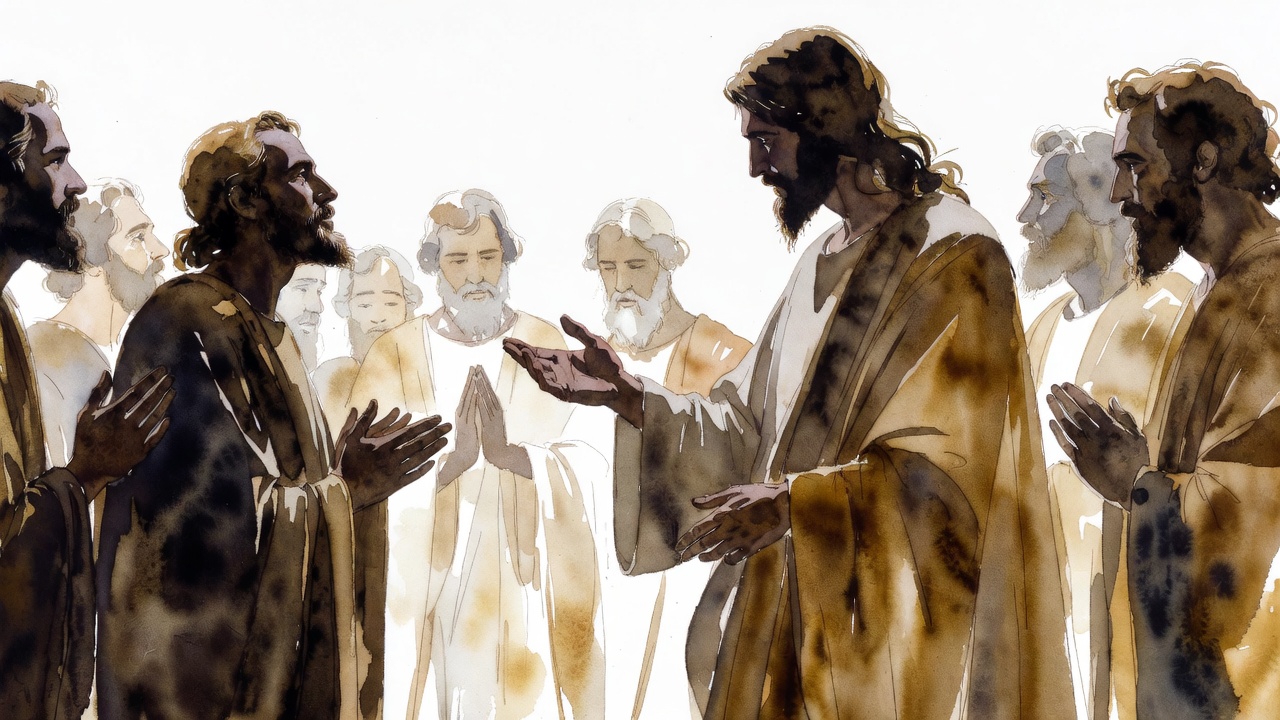Pope Francis: Christian unity is a path of synodality
Ecumenical prayer with participants in the Synod

In the Piazza dei Protomartiri Romani in Vatican City, where according to tradition the martyrdom of the Apostle Peter took place, Pope Francis presided over an ecumenical prayer on Friday afternoon, October 11, in the presence of the fraternal delegates of the Synod and several other representatives of the Christian Churches.
In his homily, delivered to the participants, Pope Francis urged Christians around the world to bear witness to their unity, focusing on their “common mission.” In conjunction with this celebration in the Vatican, local prayers were organized in 80 different places on all continents.
The prayer vigil, organised by the Taizé Community, is a continuation of the “Together” vigil, held on 30 September 2023, on the eve of the opening of the first session of the Synod on Synodality.
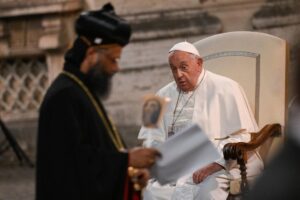 This year, the symbolic date of 11 October was chosen to commemorate the anniversary of the opening of the Second Vatican Council, which took place on 11 October 1962. “We wish to give thanks in particular for all the ecumenical fruits that have emerged from the impetus of the Council,” said Cardinal Kurt Koch, Prefect of the Dicastery for Promoting Christian Unity, in his brief introductory address, recalling the 60th anniversary of the publication of the decree on ecumenism Unitatis Redintegratio and the dogmatic Constitution on the Church Lumen Gentium.
This year, the symbolic date of 11 October was chosen to commemorate the anniversary of the opening of the Second Vatican Council, which took place on 11 October 1962. “We wish to give thanks in particular for all the ecumenical fruits that have emerged from the impetus of the Council,” said Cardinal Kurt Koch, Prefect of the Dicastery for Promoting Christian Unity, in his brief introductory address, recalling the 60th anniversary of the publication of the decree on ecumenism Unitatis Redintegratio and the dogmatic Constitution on the Church Lumen Gentium.
Extracts from the two conciliar documents were read by all the ecclesiastical leaders present, including the Orthodox Metropolitan Job, the Anglican Bishop Warner, the Archimandrite Katsynas of the Greek Orthodox Church and the Franco-Swiss Reverend Anne-Cathy Graber, pastor of the Mennonite World Conference.
Ecumenism and synodality
“The closer Christians are to Christ, the closer they are to one another,” wrote Pope Francis in his homily, taking up the words of the decree on ecumenism Unitatis Redintegratio of 21 November 1964.
The Holy Father then recalled the link between ecumenism and synodality, one accompanying the other in a process in which “it is not a question of building something, but of welcoming and doing, producing the gift that we have already received.” According to Francis, the synodal experience to date allows us to understand this “gift of unity” from various angles.
The gift of unity, an “unpredictable gift”
First, the Bishop of Rome underlined the unpredictable nature of this gift: “The true protagonist is the Holy Spirit, not us; it is He who leads us towards a greater communion.” It is therefore a gift whose processes and ways we cannot predict; we must receive it “without putting obstacles in the way of Providence and without prejudice against the impulses that may come from the Holy Spirit,” as the conciliar Decree says.
Unity is a harmonious path
In the text, Francis established that, in the image of the synodal process, “unity is a path.” That is, “it matures with movement, walking” and grows in mutual service, in the dialogue of life and in the collaboration of all Christians.
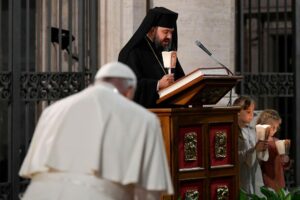 Let us have confidence in the Holy Spirit who drives us towards unity
Let us have confidence in the Holy Spirit who drives us towards unity
The Holy Father wrote that “the Synod is helping us to rediscover the beauty of the Church in the variety of its faces.” He also reiterated, as he has maintained on other occasions during his Pontificate, that unity is not uniformity nor the fruit of compromises or balancing acts.
Unity is for the mission
In the last part of his meditation, Francis stated that “the unity of Christians is necessary for their witness.” He also stated that “the ecumenical movement was born from the desire to bear witness together, with others and not apart from each other, or worse still, against each other.”
Referring to the site where the ecumenical prayer was held, the Successor of Peter suggested: “In this place, the protomartyrs remind us that today, in many parts of the world, Christians of different traditions give their lives together for faith in Jesus Christ, living the ecumenism of blood. Their witness is stronger than any word, because unity comes from the Cross of the Lord.”
Let us focus on the common foundation of our common baptism
The Pontiff took up the meaning of the penitential vigil, which took place on Tuesday 1 October, stressing that this ecumenical prayer also expressed “shame for the scandal of the division of Christians, for the scandal of not bearing witness to the Lord Jesus in unity”. In this sense, he considered the Synod as “an opportunity to improve, overcoming the walls that still exist between us”.
Full text of the Holy Father’s homily:
“The glory that you have given me I have given them” (Jn 17:22). These words from Jesus’ prayer before his Passion can be applied above all to the martyrs, who received glory for the witness they bore to Christ. In this place, we remember the First Martyrs of the Church of Rome. This Basilica was built on the site where their blood was shed; the Church was built upon their blood. May these martyrs strengthen our certainty that, in drawing closer to Christ, we draw closer to one another, sustained by the prayers of all the saints of our Churches, now perfectly one by their sharing in the paschal mystery. As we read in the Decree on Eucmenism Unitatis Redintegratio, whose sixtieth anniversary we are celebrating, the closer Christians are to Christ, the closer they are to one another (cf. 7).
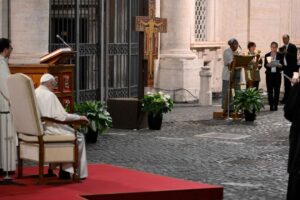 On this day, when we commemorate the opening of the Second Vatican Council, which marked the official entry of the Catholic Church into the ecumenical movement, we are gathered together with the fraternal delegates, our brothers and sisters of other Churches. I make my own the words that Saint John XXIII spoke to the Observers at the opening of the Council: “Your much-appreciated presence here and the emotion that fills my heart as a priest, as a Bishop of the Church of God… encourage me to confide to you the longing of my heart, which burns with the desire to work and suffer for the dawn of the day when Christ’s prayer at the Last Supper will be fulfilled for all” (13 October 1962). Accompanied by the prayers of the martyrs, let us enter into that same prayer of Jesus, and make it our own in the Holy Spirit.
On this day, when we commemorate the opening of the Second Vatican Council, which marked the official entry of the Catholic Church into the ecumenical movement, we are gathered together with the fraternal delegates, our brothers and sisters of other Churches. I make my own the words that Saint John XXIII spoke to the Observers at the opening of the Council: “Your much-appreciated presence here and the emotion that fills my heart as a priest, as a Bishop of the Church of God… encourage me to confide to you the longing of my heart, which burns with the desire to work and suffer for the dawn of the day when Christ’s prayer at the Last Supper will be fulfilled for all” (13 October 1962). Accompanied by the prayers of the martyrs, let us enter into that same prayer of Jesus, and make it our own in the Holy Spirit.
Christian unity and synodality are linked. In fact, “the path of synodality is what God expects of the Church of the third millennium” (Address for the Fiftieth Anniversary of the Institution of the Synod of Bishops, 17 October 2015), and it must be travelled by all Christians. “The journey of synodality… is and must be ecumenical, just as the ecumenical journey is synodal” (Address to His Holiness Mar Awa III, 19 November 2022). In both processes, it is not so much a matter of creating something as it is of welcoming and making fruitful the gift we have already received. And what does the gift of unity look like? The Synod experience is helping us to discover some aspects of this gift.
Unity is a grace, an unexpected gift. We are not its driving force; the true driving force is the Holy Spirit who guides us towards greater communion. Just as we do not know beforehand what the outcome of the Synod will be, neither do we know exactly what the unity to which we are called will be like. The Gospel tells us that Jesus, in that great prayer of his, “looked up to heaven”: unity does not come primarily from the earth, but from heaven. It is a gift whose timing and manner we cannot foresee. We must receive it by placing “no obstacle in the ways of divine Providence and [allowing] no preconceived judgements [to] impair the future inspirations of the Holy Spirit”, as the Council’s Decree goes on to say (Unitatis Redintegratio, 24). As Father Paul Couturier used to say, Christian unity must be implored “as Christ wills” and “by the means he wills”.
Another lesson that we can learn from the synodal process is that unity is a journey: it grows gradually as it progresses. It grows through mutual service, through the dialogue of life, through the cooperation of all Christians that “sets in clearer relief the features of Christ the Servant” (Unitatis Redintegratio, 12). But we, for our part, must walk by the Spirit (cf. Gal 5:16-25); or, as Saint Irenaeus says, as tôn adelphôn synodía, as “a caravan of brothers.” Christian unity grows and matures through a common pilgrimage “at God’s pace”, like that of the disciples on the way to Emmaus who journeyed with the risen Jesus at their side.
A third lesson is that unity is harmony. The Synod is helping us to rediscover the beauty of the Church in the variety of its faces. Thus unity is not uniformity, or the result of compromise or counterbalance. Christian unity is harmony among the diversity of charisms awakened by the Spirit for the building up of all Christians (cf. Unitatis Redintegratio, 4). Harmony is the way of the Spirit, for he is, as Saint Basil says, harmony itself (cf. In Ps. 29:1). We need to pursue the path of unity by virtue of our love for Christ and for all the people we are called to serve. As we travel along this path, let us never allow difficulties to stop us! Let us trust the Holy Spirit, who draws us to unity in the harmony of a multi-faceted diversity.
Lastly, like synodality, the unity of Christians is essential to their witness: unity is for the sake of mission. “That they may all be one… so that the world may believe” (Jn 17:21). This was the conviction of the Council Fathers when they declared that our division “scandalizes the world, and damages the holy cause of preaching the Gospel to every creature” (Unitatis Reintegratio, 1). The ecumenical movement evolved from the desire to bear common witness: to witness alongside one another, not standing apart from or, worse yet, at odds with one another. In this place, the Roman protomartyrs remind us that today too, in many parts of the world, Christians of different traditions are laying down their lives together for their faith in Jesus Christ, embodying an ecumenism of blood. Their witness speaks more powerfully than any words, because unity is born of the Cross of the Lord.
Before beginning this Assembly, we celebrated a penance service. Today, too, we express our shame at the scandal of division among Christians, the scandal of our failure to bear common witness to the Lord Jesus. This Synod is an opportunity to do better, to overcome the walls that still exist between us. Let us focus on the common ground of our shared Baptism, which prompts us to become missionary disciples of Christ, with a common mission. The world needs our common witness; the world needs us to be faithful to our common mission.
Dear brothers and sisters, it was before an image of the Crucified Christ that Saint Francis of Assisi received the call to restore the Church. May the Cross of Christ also guide us on our daily journey towards full unity, in harmony with one another and with all creation: “For in him all the fullness of God was pleased to dwell, and through him to reconcile to himself all things, whether on earth or in heaven, making peace by the blood of his cross” (Col 1:19-20).
Related
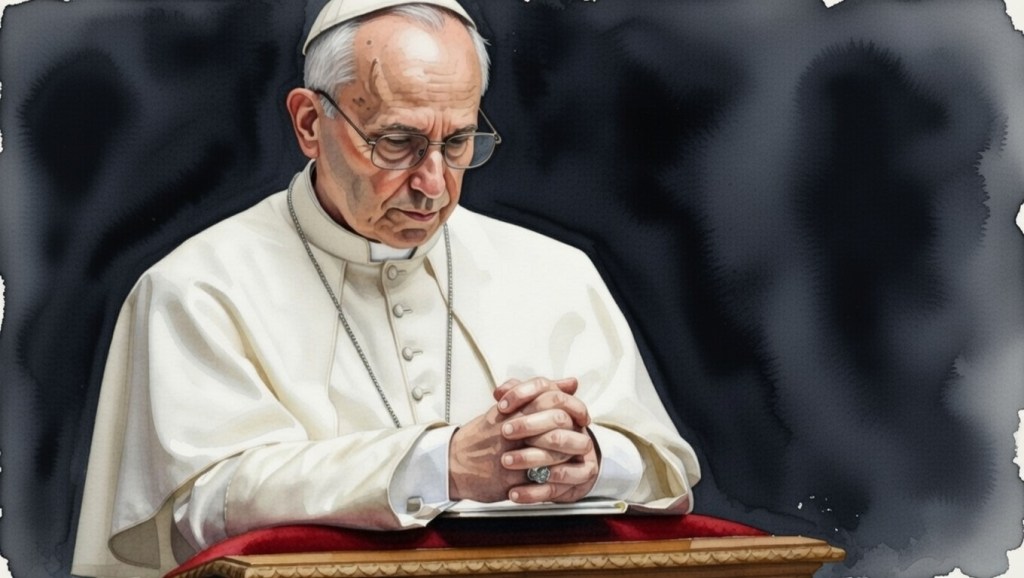
Pope Leo XIV and the Profound Experience of the Lenten Spiritual Exercises
Exaudi Staff
01 March, 2026
2 min

Its revelation is a saving surprise! Does it still draw us in?
Exaudi Staff
01 March, 2026
6 min
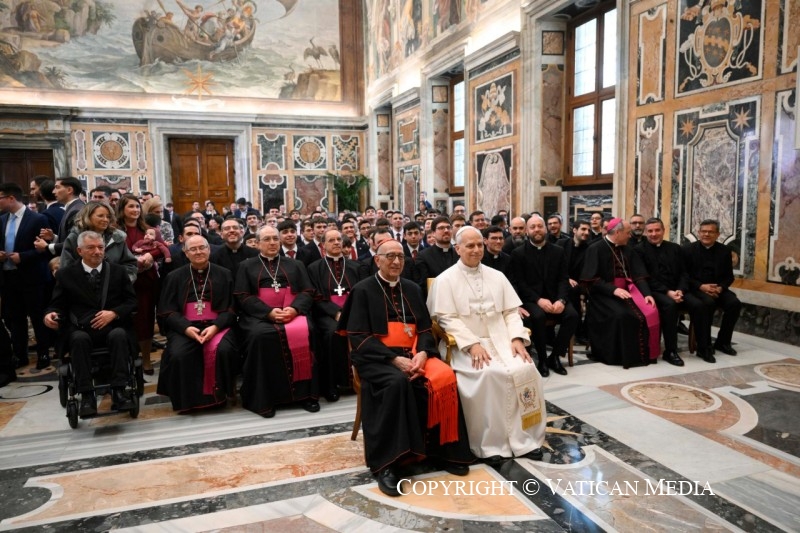
“Man is not made to live closed in on himself, but in a living relationship with God”
Exaudi Staff
01 March, 2026
5 min

“Even those without faith can be seekers of God”
Exaudi Staff
25 February, 2026
1 min
 (EN)
(EN)
 (ES)
(ES)
 (IT)
(IT)


